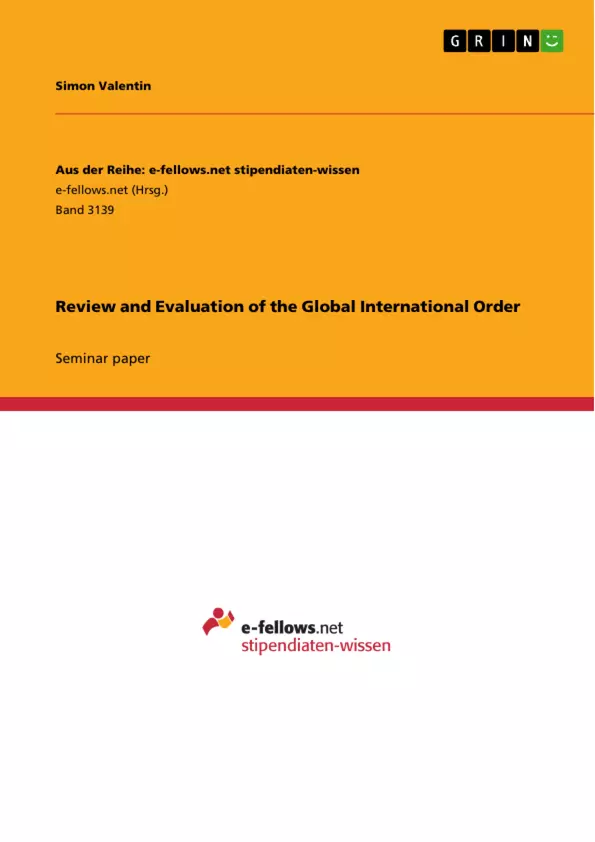Among practitioners and scientific observers, it is widely believed that the global international order is in dire straits (Duncombe & Dunne 2018; Alexandroff 2017). There is much to suggest that the old, Western-dominated world order ended in the last years at the latest and will be replaced by a, in the words of the Russian Foreign Minister Sergei Lavrov, "post-West world order” (Stent 2018) whose contours are still too indeterminate to be able to characterize them unambiguously. Against this background, I pursue three main objectives in this review: In the second chapter, following the introduction, I will reflect on what is understood as global international order and why we need to look at it. The third chapter will give an overview of the old order and its development. Chapter four sketches trajectories of a newly emerging order with the help of two observable trends. In the fifth chapter I will finally focus on the impacts of the described changes in the world order on the process of achieving the Sustainable Development Goals from the Agenda 2030.
Inhaltsverzeichnis (Table of Contents)
- Introduction
- What is the global international order?
- Emergence of the current liberal international order
- Recent development and trends
- Changes from outside - new actors and new arrangements
- Changes from inside – the crisis of the liberal community
- Consequences and perception
Zielsetzung und Themenschwerpunkte (Objectives and Key Themes)
This review aims to examine the state of the global international order, exploring its historical development, current trends, and potential impacts on the achievement of the Sustainable Development Goals. It analyzes the changing nature of power dynamics, the rise of new actors, and the challenges faced by the existing liberal international order.
- The concept of the global international order and its relevance
- The emergence and evolution of the liberal international order
- Emerging trends and challenges to the existing order, including the rise of new actors and the crisis of the liberal community
- The impact of changes in the world order on global governance and the Sustainable Development Goals
Zusammenfassung der Kapitel (Chapter Summaries)
- Introduction: This chapter introduces the concept of the global international order and highlights the widespread belief that it is in a state of flux. It outlines the main objectives and structure of the review.
- What is the global international order?: This chapter explores the concept of the global international order as a comprehensive form of political order, emphasizing its role in shaping the coexistence and future of world society. It discusses the key elements of a political order, including principles, values, rules, procedures, and institutions. It also examines the importance of legitimacy and effectiveness in establishing and sustaining political authority.
- Emergence of the current liberal international order: This chapter delves into the origins and development of the liberal international order (LIO), highlighting its core principles of open markets, multilateral institutions, human rights, and liberal democracy. It discusses the role of international organizations such as the World Bank and the World Trade Organization, and explores the critiques of the LIO as a system that favors Western countries.
- Recent development and trends: This chapter examines current trends and developments that are shaping the global international order. It focuses on changes from outside, such as the shift of power between states, the rise of new actors, and the increasing influence of non-state actors. It also examines changes from inside, such as the crisis of the liberal community and the challenges to the normative foundations of the LIO.
Schlüsselwörter (Keywords)
The primary terms and concepts explored in this review include global international order, world order, liberal international order, power dynamics, emerging actors, state-society relations, international institutions, multilateralism, human rights, liberal democracy, global governance, Sustainable Development Goals, and the crisis of the liberal community.
Frequently Asked Questions
What is meant by the "Global International Order"?
It refers to the comprehensive political order, including principles, rules, and institutions like the UN or WTO, that shapes how states and societies coexist globally.
What are the core principles of the Liberal International Order (LIO)?
The LIO is based on open markets, multilateralism, human rights, liberal democracy, and international law.
Why is the current world order considered to be in crisis?
Challenges include the rise of new non-Western actors, internal crises within liberal democracies, and a shift in power dynamics away from traditional Western dominance.
How do changes in the world order affect the Sustainable Development Goals (SDGs)?
Shifts in global governance and the crisis of multilateralism can hinder the international cooperation necessary to achieve the Agenda 2030 targets.
What is the "post-West world order" mentioned in the text?
It is a term describing a potential future order where Western countries no longer hold the primary authority to set global rules and values.
- Citation du texte
- Simon Valentin (Auteur), 2018, Review and Evaluation of the Global International Order, Munich, GRIN Verlag, https://www.grin.com/document/491910



